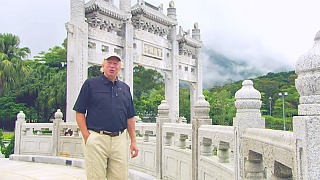With Alan Watts ...
[video v=QkQ8WIrS5Lw]Videos about philosophy, China
Something different – the big perspective
With Big Think ...
[video v=pJGCAWTgbn0]On truth – part 2
Mind control is not only very real; it is everywhere.
It is simply controlling what you 'know'.
With MagnatesMedia ...
[video v=HErV0qAzbZE]Happiness
With Einzelgänger ...
The less one desires, the more one has.
[video v=ZrMOLqgv714] Plus more videos ...
Something different : a truth or the truth
Are we all just living in our own bubble (prison) ?
With Einzelgänger ...
[video v=X0W6CX-uHhk]Solitude (philosophy)
The mystery of LaoZi, the creator of Taoism
Something different – the road traveled / untraveled
With Christian Schaffer ...
[video v=li8tTVmhcjQ]Born billionaires – how to use our heartbeats wisely (don’t miss it)
With Mo Gawdat and Rangan Chatterjee ...
[video v=GaRha3H2xFE]Live more – thoughts (psychology / philosophy) – don’t miss it
With Rangan Chatterjee ...
[video v=yL-1l4ToqDY]With Alan Watts ...
Plus more videos ...
One can see this distinction in the wider society too - East vs. West; cultures with different foundations - long term (family, infrastructure, community, the arts) versus short term (hype, sex, gossip, war). Mature versus immature. We versus me. The immature mind thinks 'me'; the mature mind understands that life is really about 'we'. Maturity is when one grows beyond the narcissism phase *. 'I' am just a small part of a bigger 'I' - humanity. With Dr. Robert Lustig ... One is controlled when one believes what one has been told (sold). Freedom is removing these mind chains and seeing reality. ----- * (footnote) At BB, we think that narcissism is a development phase that most transition out of; but some stay there and it can become exaggerated. The traditional views might also be true; likely, there is an interplay involved. ----- ----- Aside #1 : Q : Why does BB have so much content about health - nutrition and mental well-being ? A : Because it is fundamental to everything else; one cannot see the beauty of life if one's mind is mixed up; one cannot live life to the full if one is ill. ----- ----- Aside #2 : Confucius : One can grow from everybody one meets. On life's journey, one will meet wise people - learn from them; one will also meet foolish people - look deep within to see if one also has these follies.
Something different - minimalism (less is more)
With Einzelgänger ... Bonus film - Erich Fromm on 'To Have or To Be' ...
With Jason Gregory. Wu wei and the Dao (Tao) ... Bonus film - with Alan Watts ...
Confucius - wisdom that is ageless
To live, you must first die (psychology / philosophy)
To be free, is to be off the time-lapse trajectory of the past into the future. This means to stop rationalizing and die to the past - only then one can truly live in the present moment. The past is still the past, but one is no longer its hostage. What stands in the way of a true life is - you - that is, the past, that one thinks of as 'me' (a mush of programming and fantasies - the noise that precludes clarity). The truth is simple; but it is not easy. One must be aware of one's thoughts and see them not as you but as relics; to see these thoughts as what they really are and not be ruled by them. The first, and crucial, step is to see how one has been hijacked by the past. To be free, is to be free of the past. Truth is not about believing, or 'knowing', a bunch of concepts; truth is being real. At BB, we can recommend Alan Watts, Jiddu Krishnamurti and Gabor Mate as sincere and wise voices to explore this more; though there are many others, these are straight talkers (some of their talks are featured here). The thing is - the guide is not the truth, it is only a guide; never trust in or believe a guide as though it is the truth - either you simply believe this or that, or you are true. Don't be an addict - to a belief. Don't be an addict to your past and ego. 10,000 years and 100,000 books of philosophy distilled into a few sentences. Once out of the prison of the past, everything else becomes clear. Kyle Cease talks with Tom Bilyeu ... Bonus film - with Jiddu Krishnamurti ... Bonus film 2 - with Alan Watts ...
On the difference between observing and thinking (philosophy / psychology)
Truth lies in being able to see 'what is', without preconception. No what 'I already know' or what 'should be'. First, must come clear sight of that what is (the solution always lies within the question). Is one a figment of the past, and conditioning, or really alive in the present moment? Half blind or of clear sight ? With Jiddu Krishnamurti ... Bonus film - with Alan Watts - on Being There, rather than merely Passing By ...
Reality (philosophy, Alan Watts)
When a mind is like a mirror, it sees everything, and holds onto nothing. Chuang-Tzu : '... mind as a mirror; it grasps nothing; it refuses nothing; it receives, but does not keep.' The wisdom of the eloquent Alan Watts (1915 - 1973) - the insights behind both Taoism and Buddhism ...
Life lessons from Confucius (philosophy)
Living in the Now (philosophy)
Eckhart Tolle in conversation with Deepak Chopra and Wayne Dyer ...
To be free of the past that rules our world - when we see what is rather than think of what should be
Childhood trauma, and the art of parenting - and much more - with Gabor Mate (don't miss it) ... More - on society ... The root attachment / addiction is to the idea of oneself as separate; self-perpetuating, including literally. Some might call this 'hell'.
The Dao De Jing 道德經 (The Way / what is)
10,000 pearls of wisdom; when follow The Way, it is one pearl. The truths found in the Tao Te Ching are universal and timeless. A book of wisdom written by a sage named Lao-Tzu / Lao Zi, circa 500 BC, China. Read by the late Wayne Dyer ... The audio as well as the translation of the version you hear is from a book called Living The Wisdom of The Tao: Change Your Thoughts - Change Your Life by Wayne Dyer. His book includes a detailed commentary on each of the verses ...
The Dhammapada - audiobook : teachings of the Buddha
Bonus film - Siddhartha, by Hermann Hesse ...
To Have or to Be - the art of love (philosophy)
With Erich Fromm ... The Art of Being ... The Art of Love ...
The imperative to escape the past (philosophy - the love of truth)
Jiddu Krishnamurti talks about how we are enslaved, and how to be free; clear sight, without prejudice, reveals the truth / what is - that is the true knowing / now. "Distortion will inevitably come into being when there is fragmentation, when one part of you condones or condemns what you observe. We are the result of propaganda, what we have been told from childhood to believe and not to believe. Knowledge is the past; there is no knowledge in the present. To be aware without choice is to observe without the observer, which is the past, the image-maker." BB says : truth begins when belief ends ... To be free, to be eternal, is to be here, right now, not chained to the past (baggage that blinds us), or forever focused on the future (in fear). This, is it. Until we realise it, the past controls us - both own own experience (in those chains), and all that we have believed. The past gives rise to fear. Love is the absence of fear.
Alan Watts talks about Zen Buddhism - why we should stop chasing our tail. Wu Wei - action without force ... The Middle Way - the path that cannot be followed, and The Fall (anxiety) ... The truth is soooooo simple, it is hard to put into words .. Audio book - The Way of Zen ...
The Real Revolution - starts with us - Jiddu Krishnamurti (sociology, psychology, philosophy)
Filmed in 1966.
The Tao Te Ching in older PinYin. The 'Book Of The Way', by LaoZi (Lao Tsu / Lao Tse) is the essence of Daoism (Taoism). An audio book with introduction; don't miss it ... Bonus film - The Taoist Way - a talk by Alan Watts ...
An awakening ... With the new year on the doorstep, and resolutions on one's mind, BeijingBuzzz says to be yourself and not get caught up in the crowd - but, at the same time, be kind to others (and yourself) with understanding and an open heart and hand; for all of us, across the world, have the same basic dreams, and the beauty of life is partly in the variety in the expression of those hopes for a better future, and our various traditional cultures. The time is always now - this is it. Yet time is not always ours - everything is transient. While we are alive, we should live; with a mind free from the past and with eyes that see what is, without preconception. Happy New Year 2017 to all our visitors ! Tune in for the firework displays shortly ...
Harmony and balance in Chinese philosophy - video
A trailer to Richard Bangs' travel videos of GuangDong, Macau and Hong Kong around the Pearl River Delta ...
The three key philosophies of China - video
Confucianism, Buddhism and Taoism. And how they complement each other. Stephen Prothero is a Professor of Religion at Boston University. These excellent expositions are well worth a listen for all who wish to understand the Chinese civilisation, including China today.
Butterfly Dream - the wisdom of Zhuang Zi 庄子
Somewhere on ZhongNan Mountain ... "Once, ZhuangZi dreamt he was a butterfly, a butterfly flitting and fluttering around, happy with himself and doing as he pleased. He didn't know he was ZhuangZi. Suddenly he woke up and there he was, solid and unmistakable ZhuangZi. But he didn't know if he was ZhuangZi who had dreamt he was a butterfly, or a butterfly dreaming he was ZhuangZi." This hints at many questions regarding the philosophy of mind, language, epistemology (knowledge and belief), and the nature of time. The wisdom of Zhuang Zi (Chuang Tzu / Chuang Tse); 369 BC - 286 BC, a contemporary of Mencius (a disciple of Confucius). Zhuang Zi had a significant impact on Chinese Buddhism - particularly the type that is best known by its Japanese name: Zen Buddhism. Zhuang Zi is, however, essentially a key figure in Taoism, following Lao Zi (Lao Tse). A good read is 'The Way of Zen' by Alan Watts.
Buddhism, Taoism, and Confucianism in China - video
An excellent overview of the Three Teachings ...



